
Poca gente lo sabía hasta hoy. El jueves en la noche el presidente Chávez se reunió con una delegación de la Sociedad Estadounidense de Editores de Medios (ASNE por sus siglas en inglés) luego de la rueda de prensa donde atacó el informe de la Interpol y llamó “payaso” a su Director.
En la conversación con los estadounidenses, Chávez se presenta como un hombre gentil, abierto, comprensivo, sin la retórica virulenta y militarista que lo ha caracterizado. Para muchos venezolanos, esta “actuación” de Chávez podría catalogarse como la de un lobo disfrazado de cordero. La pregunta es qué interpretación obtuvieron los editores estadounidenses: ¿Lobo o cordero? Este sábado encontramos una respuesta de la mano del Boston Globe.
Comenta el impreso de la ciudad de Boston que la rueda de prensa donde Chávez denunció a la INTERPOL estuvo “extravagantemente teatral” y que los 10 a 15 minutos de la conversación con Chávez se convirtieron en dos “extraordinarias” horas.
La imagen de Chávez es la de un “presidente popular por usar los ingresos petroleros para ayudar a los más pobres de entre los pobres, por incrementar la atención médica y educativa a más necesitados a través de las misiones y por denigrar de las viejas élites.” Pero también, agrega inmediatamente, Chávez tiene sus problemas. Un nivel alarmante de homicidios, pobreza a pesar que el barril de petróleo ha subido desde los 8 dólares hasta los 120 dólares durante su mandato, alta inflación, corrupción desenfrenada y poca inversión extranjera producto, entre otras cosas, de una política agresiva de nacionalizaciones.
La conversación se centra en las relaciones con los Estados Unidos, libertad de expresión, y Fidel. Sobre sus ataques a los Estados Unidos, Chávez aseguró que no estaban dirigidos al pueblo norteamericano sino a la élite que la gobierna y que inclusive él tenía amigos en la élite cultural, citando como amigos cercanos a los actores Danny Glover, Kevin Spacey y Sean Pean. Y agregó que espera que con el nuevo gobierno de Estados Unidos tenga una mejor relación.
A la pregunta de cual era su candidato favorito: dijo que tenia uno, pero obviamente no iba a decirlo, porque quería trabajar desde el inicio en un espacio donde compartamos y lleguemos a acuerdos.
Y que conoció a Bush en Canadá durante una Reunión de las Américas, que allí le dijo en su mal inglés que quería ser su amigo y que por 20 minutos tuvo esperanza.
Dijo también que, independientemente de las ideologías, le gustaría trabajar con los Estados Unidos y otros países en problemas como la salud infantil, producción de alimentos, Y reiteró que seguirá siendo un suplidor confiable de petróleo a los Estados Unidos. “Estamos muy lejos de ser una amenaza. Somos amigos. Pero hemos sido muy mal tratados por la actual administración americana.”
Aseguró tener miedo de una invasión norteamericana y dijo tener evidencias (que no mostró) de planes de invasión. Agregó que esperaba que las cosas no llegaran tan lejos porque “no hay razones”. Entiende que si hubiera una guerra mundial o inclusive en el caso de Irak ocurrió que ese país invadió Kuwait podrían haber razones para preguntarse lo siguiente:”¿Hemos invadido a otros países? ¿Tenemos planes para invadir otros países?” También dijo que Venezuela no tenía bombas atómicas ni misiles para destruir gente. “No hay razones. Pero sabemos que tenemos petróleo y esa fue la razón de fondo para invadir Irak, y sobre todo ahora que tenemos la mayor cantidad de reservas del mundo. Nosotros somos suplidores seguros de petróleo pero si nos invaden los Estados Unidos, las cosas cambiarían drásticamente…Espero que las cosas no lleguen tan lejos.”
Les aseguró a los editores que la libertad de expresión es respetada y dijo amar el debate. “La gente aquí puede decir lo que quiera.”
Sobre Fidel, dijo que sería el mejor presidente del mundo si ese cargo existiera y agregó que lo amaba “como padre, no como hermano mayor.”
Para finalizar tocaron el tema del 2013. Chávez dijo que se sentía entre la espada y la pared porque “la gente lo acusa a uno de concentrar mucho poder. Y sin embargo, uno es un prisionero...” Se preguntó: ¿Qué vida personal es esa que que lo lleven y lo traigan para todos lados? Agregó que nunca dejará la política pero que le gustaría enseñar matemática, literatura, física, o béisbol.” Sin embargo, nunca respondió si dejaría la presidencia en el 2013.
A continuación puede leer la versión en inglés del Boston Globe:
Meeting with Americans in Venezuela, Chávez shows a kinder ‘comandante’
Martin Baron
The Boston Globe , May 17, 2008
President Hugo Chávez of Venezuela had just wrapped up a press conference, extravagant in its theatrics, where he denounced an Interpol report that authenticated documents linking his government to rebels in neighboring Colombia. That lasted four hours, and then he extended a surprise invitation to a delegation of American newspaper editors on a ‘‘fact-finding mission’’ to Venezuela: Perhaps we can spend 10 to 15 minutes together over coffee?
more stories like thisTen to 15 minutes became nearly two extraordinary hours Thursday, going deep into the night, as aides waited to get Chávez onto the plane that would carry him to a summit of European, Latin American, and Caribbean leaders the next day in Lima, Peru.
The American Society of Newspaper Editors, in planning its trip, had requested months ago to meet Chávez but the request went unanswered. Now they saw a president who was both jocular and jousting, who would talk at length about his passion for baseball (he’s a Yankees man, he told one editor), his history of blunt anti-American rhetoric (no offense, please), the fate of democracy and free expression in Venezuela (not a problem, he insists), his personal bond with Cuba’s Fidel Castro, and what he might do if he leaves office on the current mandatory schedule of 2013.
Chávez, president since 1999 and survivor of a failed coup in 2002, now faces an opposition encouraged by the defeat last December of a referendum that would have allowed him to be reelected indefinitely, while also imposing sweeping changes to the constitution that would consolidate his power. But the opposition remains fractured, with no consensus on a separate national agenda. In Chávez, it faces a man who has won support by using the national oil company to help the poorest of the poor, extending healthcare and education through a series of ‘‘missions,’’ and staring down Venezuela’s old elites. But Chávez has his problems: An alarmingly high rate of homicides ranks as a source of national shame and anxiety; poverty remains entrenched, and critics contend that oil, priced in excess of $120 a barrel today compared with $8 when Chávez came to power, should have brought far more social progress; corruption is rampant; inflation is high, growth has slowed, and foreign investors have been unnerved by, among other things, an aggressive course of nationalization of key industries.
While Chávez calls his vision ‘‘21st-Century socialism,’’ to the opposition it looks increasingly like nothing more than old, Castro-style communism. When Chávez met with American editors in his study in the presidential palace of Miraflores,, family photos behind him and speaking through an interpreter, he seemed pleased to show a kinder, gentler, more diplomatic ‘‘comandante.’’
On his attacks on the United States:
I beg for a pardon from them. I beg for forgiveness if in my speech I’ve hurt any feelings back in the States. I ask for forgiveness. When I speak about the United States, I do not refer to the people, to the citizens. I refer to the elite that is governing the United States — and not even referring to all of the elite governing the United States. Because we have friends among the elite governing the US. The economic elite, we have friends. We have friends among the cultural elite of the United States ... Danny Glover. Kevin Spacey came over here. Sean Penn. Those are my friends, close friends... And when they come over here, they say what they like and what they don’t like. And we still are friends. And that’s what we want. We want to be friends. And I hope that with the new government we can then open new space for exchange — and discuss.
On his favorite candidate in the US presidential election:
It would be a lie if I say I have no preference. However, I don’t want to take this personal, and take this candidate or that candidate... I shouldn’t say anything that might be used against someone. I’d rather be careful and see things from a distance. Our preference would be that whoever is elected, we might start immediately with some exchange. It is through talking we can then come closer and share and compare our views and then reach an agreement.
On President Bush:
I remember when I met George Bush for the first time. It was in Canada during the Summit of the Americas. We shook hands. And I said to him, with a lot of spontaneity and sincerity — and I know very little English — but I said this [in English]: I want to be your friend ... I was hopeful for about 20 minutes.
On future relations with the United States:
I would love, for instance, to be able to work with the United States, together, and other countries as well, regardless of the ideology, to work in the field of health, for instance, infant mortality, food production. In Latin America, we have 19 million malnourished people ... Haiti, this is a disaster. Children that die of hunger. Education. So many things that we can do together. Forget about the complexity of ideology. No matter how we think, there’s a world waiting for us to tackle injustices. So I wish we can do that together. Well, if we couldn’t do all that, at least we can sit down and talk.
On supplying oil to the United States:
In the case of oil, which is a serious concern in the United States, well, rest assured, we will continue supplying the United States with oil. 1.5 million barrels of oil a day for the United States — that’s half our production, and we continue increasing production, to help supply and meet the energy needs. We are far from being a threat. We are friends. But we have been ill treated by this government. But this has to change.
On whether he worries about a US invasion:
Yes, this is a genuine concern. We have evidence of plans that exist in this sense. Well, you see what has happened in Iraq and many other countries over these years ... Now I am hopeful that we don’t go that far. First of all, because there is no reason for that. I would understand if there were a big war, the world war. When Saddam Hussein invaded Kuwait, of course, even though we might question the reasons behind that, there was an act of aggression against Kuwait. Have we invaded anyone? Do we have plans to invade any other country? We are not a power. We do not have atomic bombs. We do not have missiles to destroy people, to attack other people. So there is no reason whatsoever. There is another element, of course — the bottom line, of course, but it is not a reason to invade: It is oil. I do think that the main reason to invade Iraq was the oil. And the main cause of the threats against us is again oil, and today more than ever, Venezuela has become the country with the largest oil reserves on earth ...
And we are producing 3.3 million barrels a day of oil, and we are investing in order to increase production and reach 5 million barrels in three years’ time, four years maximum ... And it’s clear that part of this increase will go to the United States ... So in case they invade us, the situation will change dramatically. If there were a war, this investment will stop. There will be no oil production increase. It would just go down, as happened in Iraq ... So I hope we will not go that far.
On free speech and how Venezuela is portrayed in the press:
I am incapable of asking people to speak well of me ... I just want you to say the truth, that’s it. We have made mistakes. We have many problems in this country. But to say, for instance, that there is a dictatorship in this country — there is no evidence whatsoever of having a dictatorship in this country. Freedom of speech is widely respected, is very open. Look, I love debate. I would be very sad if you can only hear the official voice. It would be boring. Here people are free to say whatever they think. Of course, there are rules to follow, and we need to discuss what is going on in the country. And we can exchange and compare views.
On his bond with Fidel Castro:
What I am about to say might seem an exaggeration to you. But if the world had to choose a president — a president that could address the problems of the world, a president to lead the world, a president with the powers to do that — Fidel would be the man. Perhaps he’s not the only one. ... He’s a machine, a human machine to solve problems, (with) a huge analytical capacity to analyze things and look for solutions to problems. I truly love him as a father, and it doesn’t bother me to say so. An older brother? No, he’s a father. And I think he sees me as a son. But out of respect, he calls me brother. But I think it is a father-son relationship. We used to talk a lot; now, in writing. We do not talk as often as we have in the past because he has not fully recovered from those problems he has had. We used to talk 12 hours in a row. Now it’s four hours. And, of course, it’s not as frequent as before.
On whether he will actually leave office in 2013, as currently required, and what he might do then:
[Jacques] Chirac, before giving up the presidency of France, said there is life still after politics. However, I have this fear. I think I’m doomed. Why? Because people accuse me of concentrating too much power ... And yet you are nothing but a prisoner. Because I leave this room. I get into a car. They take me to an airport to catch a plane. They take me to a car. I have all the security people around. I go to the hotel. I take the car again. And then the summit begins. And back to this room. What personal life is this? ... I do this, [and] I do it with pleasure because I understand my role right now ... My fear here is that even if I leave this palace, I will never abandon politics, at least for a while. I don’t know how many years. I don’t think the Venezuelan people, at least part of the people, would allow me to get too far away from politics. Once I finish, I am willing to do whatever the revolution requires of me. You know what I love enormously, or like a lot: to teach. I love teaching. To explain mathematics — not English. Literature, physics, or to train youngsters in baseball, for instance.
Chávez never answered whether he would be leaving office for certain in 2013.
http://www.boston.com/news/world/latinamerica/articles/2008/05/17/meeting_with_americans_in_venezuela_ch225vez_shows_a_kinder_145comandante146/?page=full
http://www.noticierodigital.com/forum/viewtopic.php?t=381103
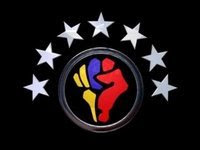



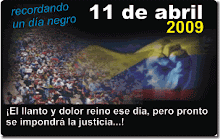



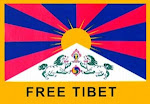
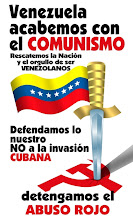






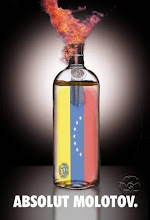
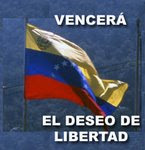
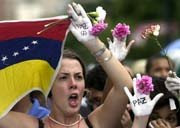
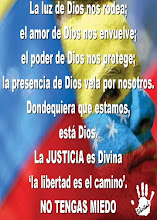
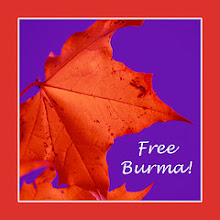

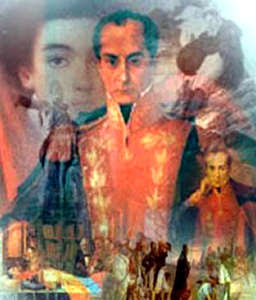
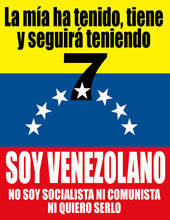
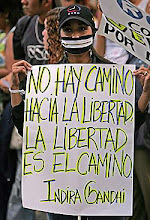




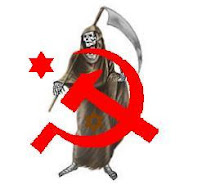
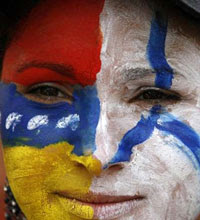
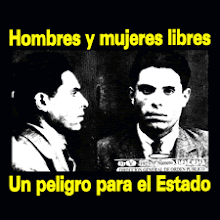
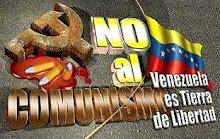
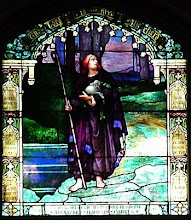
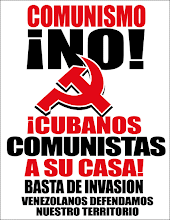


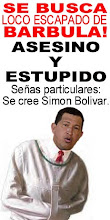
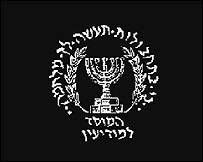
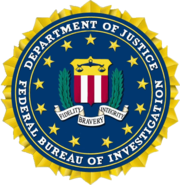
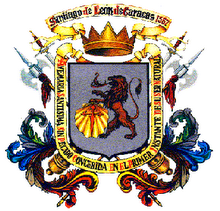


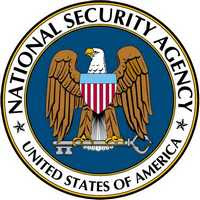


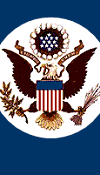
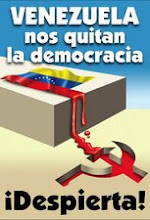



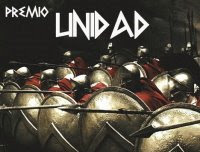
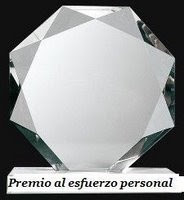
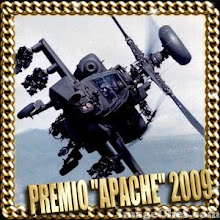
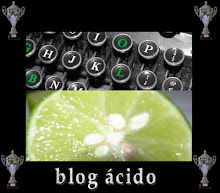
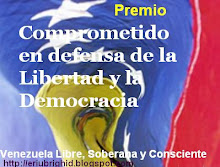
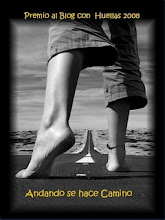
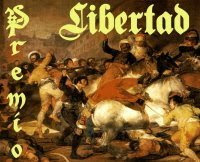



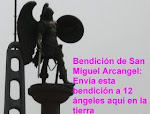


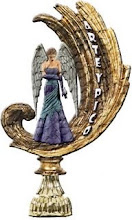












No hay comentarios:
Publicar un comentario